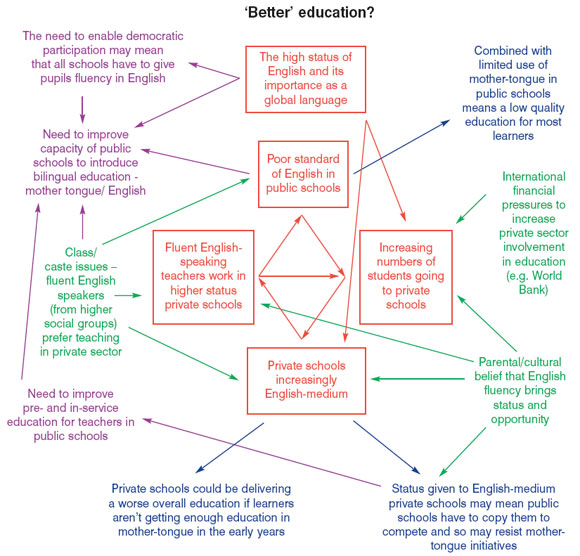The growing demand for private education in English: a barrier to inclusion?
Tony Booth
The expansion of mother tongue teaching in many countries is held back by the status and power of national and international languages, particularly English.
In this article, Tony Booth discusses a barrier to learning and participation that is often overlooked. Even when public schools promote mother tongue teaching, private schools may continue to only teach in English. The status of English becomes closely linked with a perception that private education offers a ‘better’ education. Many families feel pressured to pay private school fees they cannot afford, even in schools where the teachers are not fluent in English. Tony argues for the development of policies for inclusive Education for All that recognise the growth of English as a global language, but resist pressures for private education.
Language, democracy and rights
Citizens often receive contradictory messages about the status of their home language. The South African constitution gives equal status to 11 official national languages and promotes eight unofficial national languages, including Sign Language. Yet English, the sixth most common language used in homes, is used throughout government, the media and the legal system. To participate in that democracy you need to learn English.
The power of English globally and its dominance of the Internet means that English is important for understanding the world and the local impact of global changes. To support the democratic rights of their learners, schools need to teach through a mother tongue, perhaps help students to learn a different national language, and teach them to become fluent in English.
Rights to free public education and to learn in a family language, set out in United Nations documents, are widely disregarded. Much evidence suggests that school fees are a major cause of poor attendance, drop-outs and gender inequality in education. So when powerful international organisations, like the World Bank, pressure poorer countries to expand private fee-paying education, they are encouraging the denial of these rights and undermining Education for All.
Countries fund public education through taxation. Often, the wealthier elites send their children to private schools, and are unwilling to pay enough taxes to help develop quality free education for poorer families. Such elites have often attended English-medium schools, and may resist giving others the economic and social privileges of being fluent in English. The development of inclusive Education for All depends on overcoming such difficulties.
Lessons from India
This example from India illustrates how the high status given to both English and private education adds to the complexity of trying to expand mother tongue teaching.
Public schools in Tamil Nadu teach through Tamil, the state language. I visited schools in Chennai, the state capital, in 2005 with Indian colleagues. In one primary school the headteacher showed us the resource room for teaching English, full of special language-teaching computers donated by an American company. The computer programmes were irrelevant to the lives of local children, and delivered in strong American accents. Children were struggling to learn English from these programmes and from teachers whose English was not fluent. Some families from the area, who could hardly afford the fees, had sent their children to private English-medium schools, believing they were paying for a better education, even though the teachers’ English in these private schools was also not good.
Caste still plays a significant role in Tamil Nadu. So-called upper caste families are more likely than those from lower castes to have been educated in private schools and to have been brought up in families where English is sometimes used at home. Even though teachers’ salaries are higher in the public sector, teachers from upper caste families may not want to teach in public schools, so they keep their English language skills in the private sector.
Drawing conclusions
The success of public schools in Tamil Nadu, in appealing to diverse communities, depends in part on how well they can teach English. Yet the development of a public education system which promotes mother tongue education, the learning of a national language, and quality English teaching is a huge challenge. As well as improving pre- and in-service teacher education, it requires making available the language skills held by English-speaking elites so that they can benefit all students. Through these ways the growth of private education may be resisted.
Such challenges are widespread in economically poor countries around the world. They require dedicated action by those working within schools and communities, and those developing national and international policies.
Tony Booth is Professor of inclusive and international education at the Department of Educational Research, Canterbury Christ Church University, CT1 1QU. Email: tony.booth@canterbury.ac.uk
This diagram shows the links between the high status of the English language, the growth of private education, and attempts to develop teaching and learning in mother tongues.
Take some time to work through this complicated puzzle and reflect critically on these issues in your own context. Is your country facing similar challenges? What status does English (or another international language) have in your country? What impact is that status having on efforts to promote mother tongue teaching? Is private education becoming more or less popular in your country? Why? Can you adapt the diagram to show the situation in your country regarding the causes and effects of increased use of English in education; or the growth of private education?
Please send EENET your diagrams!

